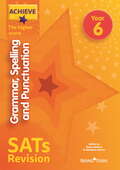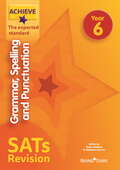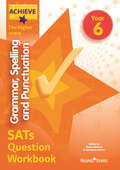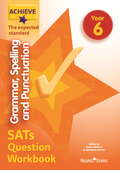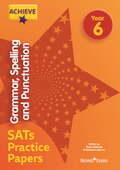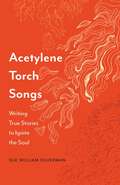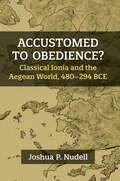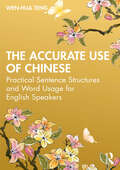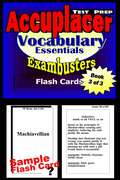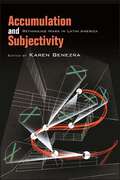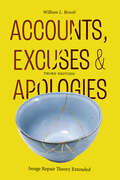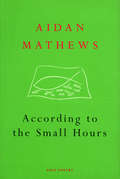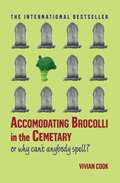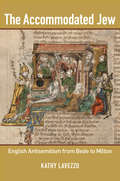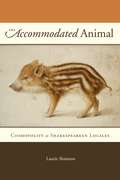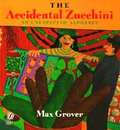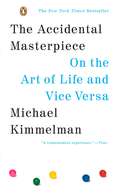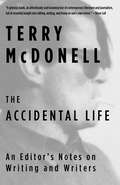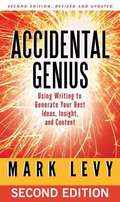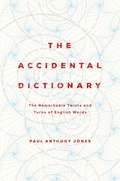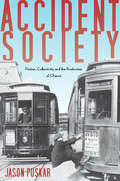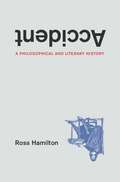- Table View
- List View
Achieve Grammar, Spelling and Punctuation SATs Revision The Higher Score Year 6 (Achieve Key Stage 2 SATs Revision)
by Marie Lallaway Madeleine BarnesAchieve. Fun and focused SATs revision.Achieve the Higher Score in Grammar, Punctuation and Spelling, with the only fully updated revision series. This book teaches children exactly how to tackle the more demanding SATs questions with confidence to get their best result. For use with more able children, this book covers everything that could be tested and provides additional challenge while ensuring children have some fun while they learn.Our unique approach has been helping children and schools perform above national average for over 15 years. Children are guided step-by-step through all question types and easy-to-digest content is presented in a simple to follow format. Clear explanations and lots of practice make it the perfect revision range for use in school and at home. This revision book:- Focuses revision on the key information children need to reach the higher score- Shows children how to get full marks on extended questions- Teaches children how to answer test questions thoughtfully and appropriately- Offers digestible content and lots of opportunities to practise,making it perfect for use in school or at homeFor best results use alongside Achieve Grammar, Spelling and Punctuation SATs Question WorkbookThe Higher Score and Achieve Grammar, Spelling and Punctuation SATs Practice Papers
Achieve Grammar, Spelling and Punctuation SATs Revision The Expected Standard Year 6 (Achieve Key Stage 2 SATs Revision)
by Marie Lallaway Madeleine BarnesAchieve. Fun and focused SATs revision.Achieve the Expected Standard in Grammar, Punctuation and Spelling, with the only fully updated revision series. This book teaches children exactly how to tackle SATs questions (even the tricky ones) with confidence to get their best result. This book covers everything that could be tested while ensuring children have some fun while they learn.Our unique approach has been helping children and schools perform above national average for over 15 years. Children are guided step-by-step through all question types and easy-to-digest content is presented in a simple to follow format. Clear explanations and lots of practice make it the perfect revision range for use in school and at home. This revision book:- Teaches children how to tackle SATs questions ...and get them right!- Focuses revision for the greatest impact on final marks- Draws on expert analysis to ensure our content is just right - Provides full guidance by topic, and includes important facts, keywords, SATs terminology, tips and example practice questions - Offers digestible content and lots of opportunities to practise,making it perfect for use in school or at homeFor best results use alongside Achieve Grammar, Spelling and Punctuation SATs Question WorkbookThe Expected Standard Year 6 and Achieve Grammar, Spelling and Punctuation Practice Papers
Achieve Grammar, Spelling and Punctuation SATs Question Workbook The Higher Score Year 6 (Achieve Key Stage 2 SATs Revision)
by Marie Lallaway Madeleine BarnesAchieve. Fun and focused SATs revision.Achieve the Higher Score in Grammar, Spelling and Punctuation, with the only fully updated revision series.Written in the style of the most recent Year 6 National Tests, this indispensable workbook will help more able children gain familiarity with the style of the more demanding areas of the 2019 national tests and covers everything that could be tested while ensuring children have some fun while they learn.Our unique approach has been helping children and schools perform above national average for over 15 years. This full colour write-in workbook:- Focuses practice on the areas of the curriculum needed to reach the higher score- Increases exam confidence with questions and terminology that mirror the SATs- Clearly shows children what examiners are looking for when marking extended questions- Draws on expert analysis to ensure our content is just right Perfect for use alongside Achieve Grammar, Spelling and Punctuation SATs Revision The Higher Score Year 6 and Achieve Grammar, Spelling and Punctuation SATs Practice Papers Year 6
Achieve Grammar, Spelling and Punctuation SATs Question Workbook The Expected Standard Year 6 (Achieve Key Stage 2 SATs Revision)
by Madeleine Barnes Marie LallawayAchieve. Fun and focused SATs revision.Achieve the Expected Standard in Grammar, Punctuation and Spelling, with the only fully updated revision series. Written in the style of the most recent Year 6 National Tests, this indispensable workbook will help children gain familiarity with the style of questions which will appear in the 2019 tests and covers everything that could be tested while ensuring children have some fun while they learn.Our unique approach has been helping children and schools perform above national average for over 15 years. This full colour write-in workbook:- Focuses practice on the areas of the curriculum needed to reach the expected standard- Builds exam confidence with questions and terminology that mirror the SATs- Provides clear explanations, top tips and digestible content - making it perfect for use in school or at home- Draws on expert analysis to ensure our content is just right Perfect for use alongside Achieve Grammar, Spelling and Punctuation SATs Revision The Expected Standard Year 6 and Achieve Grammar, Spelling and Punctuation SATs Practice Papers Year 6
Achieve Grammar, Spelling and Punctuation SATs Practice Papers Year 6 (Achieve Key Stage 2 SATs Revision)
by Marie Lallaway Madeleine BarnesAchieve. Fun and focused SATs revision.Achieve the Expected Standard in Grammar, Punctuation and Spelling, with the only fully updated revision series. Written in the style of the most recent Year 6 National Tests, this essential book is packed with full length tests papers, providing realistic practice to develop and perfect exam technique for the 2019 SATs and covers everything that could be tested while ensuring children have some fun while they learn.Our unique approach has been helping children and schools perform above national average for over 15 years. This full colour write-in book:- Builds children's ability to concentrate in a test situation - Familiarises children with the style and format of the SATs with exposure to all the question types that could be set- Identifies strengths and weaknesses to help guide revision and improve results- Saves teacher and parent preparation time with ready-made practice papers- Draws on expert analysis to ensure our content is just right For best results use alongside Achieve Grammar, Spelling and Punctuation SATs Revision The Expected Standard Year 6 and Achieve Grammar, Spelling and Punctuation SATs Question WorkbookThe Expected Standard Year 6
Acetylene Torch Songs: Writing True Stories to Ignite the Soul
by Sue William SilvermanAt times writers—from the unpublished to jaded lifers—need a fire lit under them to pursue the complex work of self-exploration. Acetylene Torch Songs provides that spark for memoirists and essayists seeking mentor-based instruction and inspiration. Drawing on twenty-five years of teaching and mentoring writers, Sue William Silverman stresses practice over theory. She encourages craftiness as well as craft and urges writers to embark on emotional quests in pursuit of their art. Acetylene Torch Songs uniquely illustrates how the writer&’s imaginative spirit comes alive on the page through metaphor, literary masks, sensory memories, voice, obsessions, and more. This holistic approach to writing emphasizes how the creative process brings together the heart, mind, and senses to illuminate the human condition through language. Featuring a personal essay in each chapter, Silverman uses her own work to model a specific concept or approach, demonstrating how obsessions, secrets, and memories can burn on the page. Through guided prompts, worksheets, checklists, publishing advice, personal essays, and strategies, Silverman encourages writers to find the confidence and courage to write stories that reach beyond the page through their intimacy, social engagement, and honesty.
Accustomed to Obedience?: Classical Ionia and the Aegean World, 480–294 BCE
by Joshua P. NudellMany histories of Ancient Greece center their stories on Athens, but what would that history look like if they didn’t? There is another way to tell this story, one that situates Greek history in terms of the relationships between smaller Greek cities and in contact with the wider Mediterranean. In this book, author Joshua P. Nudell offers a new history of the period from the Persian wars to wars that followed the death of Alexander the Great, from the perspective of Ionia. While recent scholarship has increasingly treated Greece through the lenses of regional, polis, and local interaction, there has not yet been a dedicated study of Classical Ionia. This book fills this clear gap in the literature while offering Ionia as a prism through which to better understand Classical Greece. This book offers a clear and accessible narrative of the period between the Persian Wars and the wars of the early Hellenistic period, two nominal liberations of the region. The volume complements existing histories of Classical Greece. Close inspection reveals that the Ionians were active partners in the imperial endeavor, even as imperial competition constrained local decision-making and exacerbated local and regional tensions. At the same time, the book offers interventions on critical issues related to Ionia such as the Athenian conquest of Samos, rhetoric about the freedom of the Greeks, the relationship between Ionian temple construction and economic activity, the status of the Panionion, Ionian poleis and their relationship with local communities beyond the circle of the dodecapolis, and the importance of historical memory to our understanding of ancient Greece. The result is a picture of an Aegean world that is more complex and less beholden narratives that give primacy to the imperial actors at the expense of local developments.
The Accurate Use of Chinese: Practical Sentence Structures and Word Usage for English Speakers
by Wen-Hua TengThe Accurate Use of Chinese: Practical Sentence Structures and Word Usage for English Speakers is a unique learning resource for learners of Chinese who are English speakers. The primary goal is two-fold: to help these learners leverage their existent knowledge in English and navigate the Chinese system with fewer obstacles; and also to help them prevent errors of which the underlying cause may be English. This is done through comparisons of selected grammar topics, language rules and word usages between the two languages. Grammar topics in English serve as the comparison points from which learners can gain a deeper understanding of the comparable, but differing structures in Chinese. The book's comparative approach is unique and innovative, designed to build a more nuanced and instinctive approach to grammar. A valuable resource for beginners to advanced learners and instructors of Chinese, the book contextualizes grammar structures and provides in-depth information not covered in Chinese language textbooks.
Accuplacer Test Prep Flash Cards: Vocabulary Review (Exambusters Accuplacer Workbook #3 of 3)
by Ace Inc.<P><P><i>Advisory: Bookshare has learned that this book offers only partial accessibility. We have kept it in the collection because it is useful for some of our members. Benetech is actively working on projects to improve accessibility issues such as these.</i><P><P> 500 essential words every student should know. Includes sample sentence, part of speech, pronunciation, succinct, easy-to-remember definition, and common synonyms and antonyms. <P> Exambusters Accuplacer Prep Workbooks provide comprehensive, fundamental Accuplacer review--one fact at a time--to prepare students to take practice Accuplacer tests. Each Accuplacer study guide focuses on one specific subject area covered on the Accuplacer exams. From 300 to 600 questions and answers, each volume in the Accuplacer series is a quick and easy, focused read. Reviewing Accuplacer flash cards is the first step toward more confident Accuplacer preparation and ultimately, higher Accuplacer exam scores!
Accumulation and Subjectivity: Rethinking Marx in Latin America
by Karen BenezraSince the 1970s, sociocultural analysis in Latin American studies has been marked by a turn away from problems of political economy. Accumulation and Subjectivity challenges this turn while reconceptualizing the relationship between political economy and the life of the subject. The fourteen essays in this volume show that, in order to understand the dynamics governing the extraction of wealth under contemporary capitalism, we also need to consider the collective subjects implied in this operation at an institutional, juridical, moral, and psychic level. More than merely setting the scene for social and political struggle, Accumulation and Subjectivity reveals Latin America to be a cauldron for thought for a critique of political economy and radical political change beyond its borders. Combining reflections on political philosophy, intellectual history, narrative, law, and film from the colonial period to the present, it provides a new conceptual vocabulary rooted in the material specificity of the region and, for this very reason, potentially translatable to other historical contexts. This collection will be of interest to scholars of Marxism, Latin American literary and cultural studies, and the intellectual history of the left.
Accounts, Excuses, and Apologies, Third Edition: Image Repair Theory Extended
by William L. BenoitIn our constantly plugged-in and connected world, image is everything. People, groups, organizations, and countries frequently come under suspicion of wrongdoing and sometimes require defense. Accounts, Excuses, and Apologies describes the image-repair strategies that may be used to help defuse these threats.The Third Edition of this classic book builds on theories for rehabilitating a damaged reputation by adding two new forms of denial: straw denial (appearing to deny an accusation by sidestepping it) and deflecting attention (trying to get the audience to focus on something other than the accusations against you). Five contexts for image repair are examined: corporate, political, sports/entertainment, international, and third party (when one person or organization tries to repair the image of another). The book’s case studies include current instances of reputation repair, including Vladimir Putin on Ukraine and President Joe Biden on Afghanistan; Southwest Airlines on flight cancellations; Kobe Bryant on accusations of rape; and Donald Trump on the January 6 hearings.
According to the Small Hours
by Aidan MathewsIn this, his first collection of poems in fifteen years, Aidan Mathews brings together the sacred and the profane, playful and profound, the iconic and the everyday - illuminating the variousness and commonality of human experience. These poems wear their erudition lightly: dazzling us with their fresh observations, the strangely intimate details ('mice among the breadcrumbs of the Last Supper') and a fluid, metaphysical wit that can link a saint's matyrdom to a Sunday roast. Mercurial, passionate and always surprising, According to the Small Hours is a triumphant return to the form.
Accomodating Brocolli in the Cemetary: Or Why Can't Anybody Spell?
by Vivian Cook"It is a damn poor mind that can think of only one way to spell a word." -- Andrew Jackson Weird or wierd? Necessary or neccessary? Recomend or recommend? English spelling is fiendish, but that doesn't mean you can't have fun with it. Accomodating Brocolli in the Cemetary is at once a celebration of spelling and a solace to anyone who has ever struggled with the arcane rules of the English language. As amusing as he is informative, Vivian Cook thrills the reader with more than a hundred entries -- from photographs of hilariously misspelled signs to quizzes best taken in private to schadenfreude-rich examples of spelling errors of literary greats -- that will tickle the inner spelling geek in every reader. It all adds up to a gem of a book that takes a wry look at the hodgepodge evolution of spelling and the eccentric way it actually works. Difficult Words Spelling Test Circle whichever one is right. 1. dessicate desiccate desicate 2. ecstasy exstacy ecstacy 3. adress adres address 4. dumbel dumbbell dumbell 5. accomodate accommodate acommodate 6. necesary neccesary necessary 7. liaison liaision liason 8. pronounciation pronounceation pronunciation 9. ocurence occurrence occurence 10. embarass embaras embarrass 11. brocolli broccolli broccoli 12. refering referring refferring 13. cemetery semetary cemetary
The Accommodated Jew: English Antisemitism from Bede to Milton
by Kathy LavezzoEngland during the Middle Ages was at the forefront of European antisemitism. It was in medieval Norwich that the notorious "blood libel" was first introduced when a resident accused the city's Jewish leaders of abducting and ritually murdering a local boy. England also enforced legislation demanding that Jews wear a badge of infamy, and in 1290, it became the first European nation to expel forcibly all of its Jewish residents. In The Accommodated Jew, Kathy Lavezzo rethinks the complex and contradictory relation between England’s rejection of “the Jew” and the centrality of Jews to classic English literature. Drawing on literary, historical, and cartographic texts, she charts an entangled Jewish imaginative presence in English culture. In a sweeping view that extends from the Anglo-Saxon period to the late seventeenth century, Lavezzo tracks how English writers from Bede to Milton imagine Jews via buildings—tombs, latrines and especially houses—that support fantasies of exile. Epitomizing this trope is the blood libel and its implication that Jews cannot be accommodated in England because of the anti-Christian violence they allegedly perform in their homes. In the Croxton Play of the Sacrament, Marlowe’s The Jew of Malta, and Shakespeare’s The Merchant of Venice, the Jewish house not only serves as a lethal trap but also as the site of an emerging bourgeoisie incompatible with Christian pieties. Lavezzo reveals the central place of “the Jew” in the slow process by which a Christian “nation of shopkeepers” negotiated their relationship to the urban capitalist sensibility they came to embrace and embody. In the book’s epilogue, she advances her inquiry into Victorian England and the relationship between Charles Dickens (whose Fagin is the second most infamous Jew in English literature after Shylock) and the Jewish couple that purchased his London home, Tavistock House, showing how far relations between gentiles and Jews in England had (and had not) evolved.
The Accommodated Animal: Cosmopolity in Shakespearean Locales
by Laurie ShannonShakespeare wrote of lions, shrews, horned toads, curs, mastiffs, and hellhounds. But the word OC animalOCO itself only appears very rarely in his work, which was in keeping with sixteenth-century usage. As Laurie Shannon reveals in "The Accommodated Animal," the modern human / animal divide first came strongly into play in the seventeenth century, with DescartesOCOs famous formulation that reason sets humans above other species: OC I think, therefore I am. OCO Before that moment, animals could claim a firmer place alongside humans in a larger vision of belonging, or what she terms cosmopolity. aWith Shakespeare as her touchstone, Shannon explores the creaturely dispensation that existed until Descartes. She finds that early modern writers used classical natural history and readings of Genesis to credit animals with various kinds of stakeholdership, prerogative, and entitlement, employing the language of politics in a constitutional vision of cosmic membership. Using this political idiom to frame cross-species relations, Shannon argues, carried with it the notion that animals possess their own investments in the world, a point distinct from the question of whether animals have reason. It also enabled a sharp critique of the tyranny of humankind. By answering OC the question of the animalOCO historically, "The Accommodated Animal" makes a brilliant contribution to cross-disciplinary debates engaging animal studies, political theory, intellectual history, and literary studies. "
The Accidental Zucchini: An Unexpected Alphabet
by Max GroverIn Max Grover's zany alphabet book, ordinary objects become fresh and new, while the extraordinary suddenly look familiar. Chew the fat with a neighbor over your Fork Fence! Ride the Macaroni Merry-go-round for the twirl of your life! And, heavens, hope for sunshine if you're wearing your Umbrella Underwear!
The Accidental Masterpiece: On the Art of Life and Vice Versa
by Michael KimmelmanA New York Times bestseller—a dazzling and inspirational survey of how art can be found and appreciated in everyday lifeMichael Kimmelman, the prominent New York Times writer and a regular contributor to The New York Review of Books, is known as a deep and graceful writer across the disciplines of art and music and also as a pianist who understands something about the artist's sensibility from the inside. Readers have come to expect him not only to fill in their knowledge about art but also to inspire them to think about connections between art and the larger world - which is to say, to think more like an artist. Kimmelman's many years of contemplating and writing about art have brought him to this wise, wide-ranging, and long-awaited book.It explores art as life's great passion, revealing what we can learn of life through pictures and sculptures and the people who make them. It assures us that art - points of contact with the exceptional that are linked straight to the heart - can be found almost anywhere and everywhere if only our eyes are opened enough to recognize it. Kimmelman regards art, like all serious human endeavors, as a passage through which a larger view of life may come more clearly into focus. His book is a kind of adventure or journey.It carries the message that many of us may not yet have learned how to recognize the art in our own lives. To do so is something of an art itself. A few of the characters Kimmelman describes, like Bonnard and Chardin, are great artists. But others are explorers and obscure obsessives, paint-by-numbers enthusiasts, amateur shutterbugs, and collectors of strange odds and ends. Yet others, like Charlotte Solomon, a girl whom no one considered much of an artist but who secretly created a masterpiece about the world before her death in Auschwitz, have reserved spots for themselves in history, or not, with a single work that encapsulates a whole life.Kimmelman reminds us of the Wunderkammer, the cabinet of wonders - the rage in seventeenth-century Europe and a metaphor for the art of life. Each drawer of the cabinet promises something curious and exotic, instructive and beautiful, the cabinet being a kind of ideal, self-contained universe that makes order out of the chaos of the world. The Accidental Masterpiece is a kind of literary Wunderkammer, filled with lively surprises and philosophical musings. It will inspire readers to imagine their own personal cabinet of wonders.
The Accidental Life: An Editor's Notes on Writing and Writers
by Terry McdonellA celebration of the writing and editing life, as well as a look behind the scenes at some of the most influential magazines in America (and the writers who made them what they are). You might not know Terry McDonell, but you certainly know his work. Among the magazines he has top-edited: Outside, Rolling Stone, Esquire, and Sports Illustrated. In this revealing memoir, McDonell talks about what really happens when editors and writers work with deadlines ticking (or drinks on the bar). His stories about the people and personalities he's known are both heartbreaking and bitingly funny--playing "acid golf" with Hunter S. Thompson, practicing brinksmanship with David Carr and Steve Jobs, working the European fashion scene with Liz Tilberis, pitching TV pilots with Richard Price. Here, too, is an expert's practical advice on how to recruit--and keep--high-profile talent; what makes a compelling lede; how to grow online traffic that translates into dollars; and how, in whatever format, on whatever platform, a good editor really works, and what it takes to write well. Taking us from the raucous days of New Journalism to today's digital landscape, McDonell argues that the need for clear storytelling from trustworthy news sources has never been stronger. Says Jeffrey Eugenides: "Every time I run into Terry, I think how great it would be to have dinner with him. Hear about the writers he's known and edited over the years, what the magazine business was like back then, how it's changed and where it's going, inside info about Edward Abbey, Jim Harrison, Annie Proulx, old New York, and the Swimsuit issue. That dinner is this book."From the Hardcover edition.
The Accidental Life: An Editor's Notes on Writing and Writers
by Terry McdonellA celebration of the writing and editing life, as well as a look behind the scenes at some of the most influential magazines in America (and the writers who made them what they are). You might not know Terry McDonell, but you certainly know his work. Among the magazines he has top-edited: Outside, Rolling Stone, Esquire, and Sports Illustrated. In this revealing memoir, McDonell talks about what really happens when editors and writers work with deadlines ticking (or drinks on the bar). His stories about the people and personalities he's known are both heartbreaking and bitingly funny--playing "acid golf" with Hunter S. Thompson, practicing brinksmanship with David Carr and Steve Jobs, working the European fashion scene with Liz Tilberis, pitching TV pilots with Richard Price. Here, too, is an expert's practical advice on how to recruit--and keep--high-profile talent; what makes a compelling lede; how to grow online traffic that translates into dollars; and how, in whatever format, on whatever platform, a good editor really works, and what it takes to write well. Taking us from the raucous days of New Journalism to today's digital landscape, McDonell argues that the need for clear storytelling from trustworthy news sources has never been stronger. Says Jeffrey Eugenides: "Every time I run into Terry, I think how great it would be to have dinner with him. Hear about the writers he's known and edited over the years, what the magazine business was like back then, how it's changed and where it's going, inside info about Edward Abbey, Jim Harrison, Annie Proulx, old New York, and the Swimsuit issue. That dinner is this book."From the Hardcover edition.
Accidental Genius: Using Writing to Generate Your Best Ideas, Insights, and Content
by Mark LevyLevy shows readers how to tap into their most powerful creative thinking by using a variety of writing exercises. This second edition includes updates on how to use these exercises to generate raw material for books, articles, presentations, blog posts, and tweets.
The Accidental Dictionary: The Remarkable Twists And Turns Of English Words
by Paul Anthony JonesBrimming with hidden histories and tantalizing twists, The Accidental Dictionary tells the extraordinary stories behind ordinary words. Our everyday language is full of surprises; its origins are stranger than you might think. Any word might be knocked and buffeted, subjected to twists and turns, expansions and contractions, happy and unhappy accidents. There are intriguing tales behind even the most familiar terms, and they can say as much about the present as they do the past. Busking, for instance, originally meant piracy. Grin meant to snarl. A bimbo was a man; nice meant ignorant; glamor was magic, and a cupboard was a table. Buxom used to mean obedient; a cloud was a rock; raunchy originally meant dirty. Focusing on one hundred surprising threads in the evolution of English, The Accidental Dictionary reveals the etymological origins and quirky developments that have led to the meanings we take for granted today. It is a weird and wonderful journey into words. So, let's revel in its randomness and delight in its diversity—our dictionary is indeed accidental.
Accident Society: Fiction, Collectivity, and the Production of Chance
by Jason PuskarThis book argues that language and literature actively produced chance in the late nineteenth and early twentieth centuries by categorizing injuries and losses as innocent of design. Automobile collisions and occupational injuries became "car accidents" and "industrial accidents." During the post-Civil War period of racial, ethnic, and class-based hostility, chance was an abstract enemy against which society might unite. By producing chance, novels by William Dean Howells, Stephen Crane, Anna Katharine Green, Edith Wharton, Theodore Dreiser, and James Cain documented and helped establish new modes of collective interdependence. Chance here is connected not with the competitive individualism of the Gilded Age, but with important progressive and social democratic reforms, including developments in insurance, which had long employed accident narratives to shape its own "mutual society." Accident Society reveals the extent to which American collectivity has depended--and continues to depend--on the literary production of chance.
Accident: A Philosophical and Literary History
by Ross HamiltonFrom ancient philosophy to Tristram Shandy and Buster Keaton movies, this book tells the engaging history of accident as an idea. An accidental glance at a newspaper notice causes Rousseau to collapse under the force of a vision. A car accidentally hits Giacometti, and he experiences an epiphany. Darwin introduces accident to the basic process of life, and Freud looks to accident as the expression of unconscious desire. Accident, Ross Hamilton claims, is the force that makes us modern. Tracing the story of accident from Aristotle to Buster Keaton and beyond, Hamilton’s daring book revives the tradition of the grand history of ideas. Accident tells an original history of Western thought from the perspective of Aristotle’s remarkably durable categories of accident and substance. Throughout antiquity and the Middle Ages, Aristotle’s distinction underwrote an insistence on order and subordination of the inessential. In a groundbreaking innovation, Hamilton argues that after the Reformation, the concept of accident began to change places with that of substance: accident became a life-transforming event and effectively a person’s essence. For moderns, it is the accidental, seemingly trivial moments of consciousness that, like Wordsworth’s “spots of time,” create constellations of meaning in our lives. Touching on a broad array of images and texts—Augustine, Dante, the frescoes of Raphael, Descartes, Jane Austen, the work of the surrealists, and twentieth-century cinema—Hamilton provides a new way to map the mutations of personal identity and subjectivity.
Accident: A Philosophical and Literary History
by Ross HamiltonFrom ancient philosophy to Tristram Shandy and Buster Keaton movies, this book tells the engaging history of accident as an idea. An accidental glance at a newspaper notice causes Rousseau to collapse under the force of a vision. A car accidentally hits Giacometti, and he experiences an epiphany. Darwin introduces accident to the basic process of life, and Freud looks to accident as the expression of unconscious desire. Accident, Ross Hamilton claims, is the force that makes us modern. Tracing the story of accident from Aristotle to Buster Keaton and beyond, Hamilton’s daring book revives the tradition of the grand history of ideas. Accident tells an original history of Western thought from the perspective of Aristotle’s remarkably durable categories of accident and substance. Throughout antiquity and the Middle Ages, Aristotle’s distinction underwrote an insistence on order and subordination of the inessential. In a groundbreaking innovation, Hamilton argues that after the Reformation, the concept of accident began to change places with that of substance: accident became a life-transforming event and effectively a person’s essence. For moderns, it is the accidental, seemingly trivial moments of consciousness that, like Wordsworth’s “spots of time,” create constellations of meaning in our lives. Touching on a broad array of images and texts—Augustine, Dante, the frescoes of Raphael, Descartes, Jane Austen, the work of the surrealists, and twentieth-century cinema—Hamilton provides a new way to map the mutations of personal identity and subjectivity.
Accident: A Philosophical and Literary History
by Ross HamiltonFrom ancient philosophy to Tristram Shandy and Buster Keaton movies, this book tells the engaging history of accident as an idea. An accidental glance at a newspaper notice causes Rousseau to collapse under the force of a vision. A car accidentally hits Giacometti, and he experiences an epiphany. Darwin introduces accident to the basic process of life, and Freud looks to accident as the expression of unconscious desire. Accident, Ross Hamilton claims, is the force that makes us modern. Tracing the story of accident from Aristotle to Buster Keaton and beyond, Hamilton’s daring book revives the tradition of the grand history of ideas. Accident tells an original history of Western thought from the perspective of Aristotle’s remarkably durable categories of accident and substance. Throughout antiquity and the Middle Ages, Aristotle’s distinction underwrote an insistence on order and subordination of the inessential. In a groundbreaking innovation, Hamilton argues that after the Reformation, the concept of accident began to change places with that of substance: accident became a life-transforming event and effectively a person’s essence. For moderns, it is the accidental, seemingly trivial moments of consciousness that, like Wordsworth’s “spots of time,” create constellations of meaning in our lives. Touching on a broad array of images and texts—Augustine, Dante, the frescoes of Raphael, Descartes, Jane Austen, the work of the surrealists, and twentieth-century cinema—Hamilton provides a new way to map the mutations of personal identity and subjectivity.
